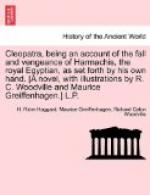“Gracious thanks be to the King of Love for this small mercy,” she answered, looking at me strangely. “Now, enough of wit; come forth upon this balcony—tell me of the mystery of those stars of thine. For I always loved the stars, that are so pure and bright and cold, and so far away from our fevered troubling. There I would wish to dwell, rocked on the dark bosom of the night, and losing the little sense of self as I gazed for ever on the countenance of yon sweet-eyed space. Nay—who can tell, Harmachis?—perhaps those stars partake of our very substance, and, linked to us by Nature’s invisible chain, do, indeed, draw our destiny with them as they roll. What says the Greek fable of him who became a star? Perchance it has truth, for yonder tiny sparks may be the souls of men, but grown more purely bright and placed in happy rest to illume the turmoil of their mother-earth. Or are they lamps hung high in the heavenly vault that night by night some Godhead, whose wings are Darkness, touches with his immortal fire so that they leap out in answering flame? Give me of thy wisdom and open these wonders to me, my servant, for I have little knowledge. Yet my heart is large, and I would fill it, for I have the wit, could I but find the teacher.”
Thereon, being glad to find footing on a safer shore, and marvelling somewhat to learn that Cleopatra had a place for lofty thoughts, I spoke and willingly told her such things as are lawful. I told her how the sky is a liquid mass pressing round the earth and resting on the elastic pillars of the air, and how above is the heavenly ocean Nout, in which the planets float like ships as they rush upon their radiant way. I told her many things, and amongst them how, through the certain never-ceasing movement of the orbs of light, the planet Venus, that was called Donaou when she showed as the Morning Star, became the planet Bonou when she came as the sweet Star of Eve. And while I stood and spoke watching the stars, she sat, her hands clasped upon her knee, and watched my face.
“Ah!” she broke in at length, “and so Venus is to be seen both in the morning and the evening sky. Well, of a truth, she is everywhere, though she best loves the night. But thou lovest not that I should use these Latin names to thee. Come, we will talk in the ancient tongue of Khem, which I know well; I am the first, mark thou, of all the Lagidae who know it. And now,” she went on, speaking in my own tongue, but with a little foreign accent that did but make her talk more sweet, “enough of stars, for, when all is said, they are but fickle things, and perhaps may even now be storing up an evil hour for thee or me, or for both of us together. Not but what I love to hear thee speak of them, for then thy face loses that gloomy cloud of thought which mars it and grows quick and human. Harmachis, thou art too young for such a solemn trade; methinks that I must find thee a better. Youth comes but once; why waste it in these musings? It is time to think when we can no longer act. Tell me how old art thou, Harmachis?”




